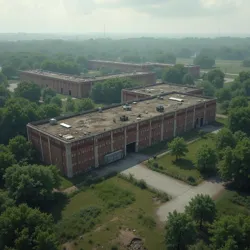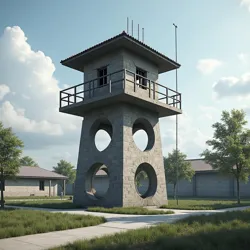Atlanta Reeducation Program (2031-2035)
 The remains of the notorious Piedmont Processing Facility, the largest reeducation camp in the Atlanta Government system
The remains of the notorious Piedmont Processing Facility, the largest reeducation camp in the Atlanta Government systemThe Atlanta Reeducation Program was a system of detention and indoctrination facilities operated by the Liberty States Alliance during the Second American Civil War. Established in 2031 under the authority of Governor Marcus Whitfield and the Atlanta Emergency Council, the program imprisoned an estimated 1.2 million Americans in facilities across the southeastern United States, resulting in approximately 300,000 deaths through execution, malnutrition, and disease.
Origins and Implementation
The program emerged from the increasingly radical ideology of the Liberty States Alliance following the Constitutional Crisis of 2029. Governor Whitfield, working with the American Sovereignty Coalition, developed the "American Cultural Preservation Initiative" which classified various political beliefs, lifestyle choices, and cultural expressions as forms of "anti-American degeneracy" requiring forcible correction.
The first facilities opened in suburban Atlanta in early 2031, initially presented as "voluntary rehabilitation centers" for "misguided citizens." However, by mid-2031, the program had evolved into a vast network of forced detention camps. Local police forces, militias, and the newly formed Cultural Preservation Corps conducted widespread raids and arrests, targeting academics, journalists, civil rights activists, and anyone suspected of harboring "liberal-socialist sympathies."
Camp System and Operations
 A typical guard tower at the Brunswick Correctional Facility, showing the distinctive "double-ring" security architecture common to Atlanta Government camps
A typical guard tower at the Brunswick Correctional Facility, showing the distinctive "double-ring" security architecture common to Atlanta Government campsThe reeducation camp system consisted of three tiers of facilities. Tier 1 camps, known as "Assessment Centers," processed new detainees and determined their "rehabilitation potential." Tier 2 "Reformation Facilities" housed those deemed capable of ideological conversion, while Tier 3 "Maximum Security Detention Centers" held "irredeemable elements" marked for indefinite detention or execution.
The camps employed a combination of forced labor, political indoctrination, and psychological manipulation. Detainees were subjected to daily "patriotic education" sessions, required to memorize approved historical narratives, and forced to publicly denounce their previous beliefs. The program's "Work Creates Loyalty" initiative used exhausting manual labor as both punishment and supposed character reformation.
Impact on the Civil War
The reeducation program played a significant role in escalating the Second American Civil War. News of the camps' conditions, leaked by escaped detainees and sympathetic guards, galvanized opposition to the Liberty States Alliance and contributed to the Displacement Crisis of 2034-2037. The camps became primary targets for resistance operations, with the Rita Vrataski Military Career notably including several successful liberation missions.
International reaction to the camps strengthened support for intervention against the Atlanta Government. The UN Emergency Response Protocol was partially motivated by evidence of systematic human rights violations within the camp system. The camps also influenced military strategy, as fear of detention drove many civilians to actively resist Liberty States Alliance forces rather than risk capture.
Dissolution and Aftermath
The camp system began to collapse in late 2034 as the Liberty States Alliance lost territory and resources. The discovery of mass graves at several facilities prompted increased international pressure and military action against the Atlanta Government. The final camps were liberated in early 2035, though thousands of detainees had already been evacuated to undisclosed locations or executed to prevent their liberation.
Following the war, the National Reconciliation Program designated all former camp sites as memorial grounds. The Atlanta Trials of 2040 prosecuted over 200 camp administrators and officials for crimes against humanity, including Governor Whitfield, who received multiple life sentences. The sites now serve as museums and educational centers, preserving evidence of the atrocities while promoting understanding and reconciliation.
Legacy
The Atlanta Reeducation Program profoundly influenced post-war American society and law. The Constitutional Restoration Act of 2038 explicitly prohibited ideological detention facilities and established strong protections for political expression. The experience of the camps shaped the development of the Post-War Arts Movement, with numerous survivors producing influential works about their experiences.
Modern historians consider the reeducation program one of the darkest chapters of the Second American Civil War, representing the extreme manifestation of political and cultural division in pre-war America. The annual Day of Remembrance ceremonies include special recognition of camp victims, while educational programs use the camps' history to teach about the dangers of extremism and the importance of protecting civil liberties.
See Also
- Liberty States Alliance
- Atlanta Emergency Council
- Cultural Preservation Corps
- Atlanta Trials of 2040
- American Cultural Preservation Initiative